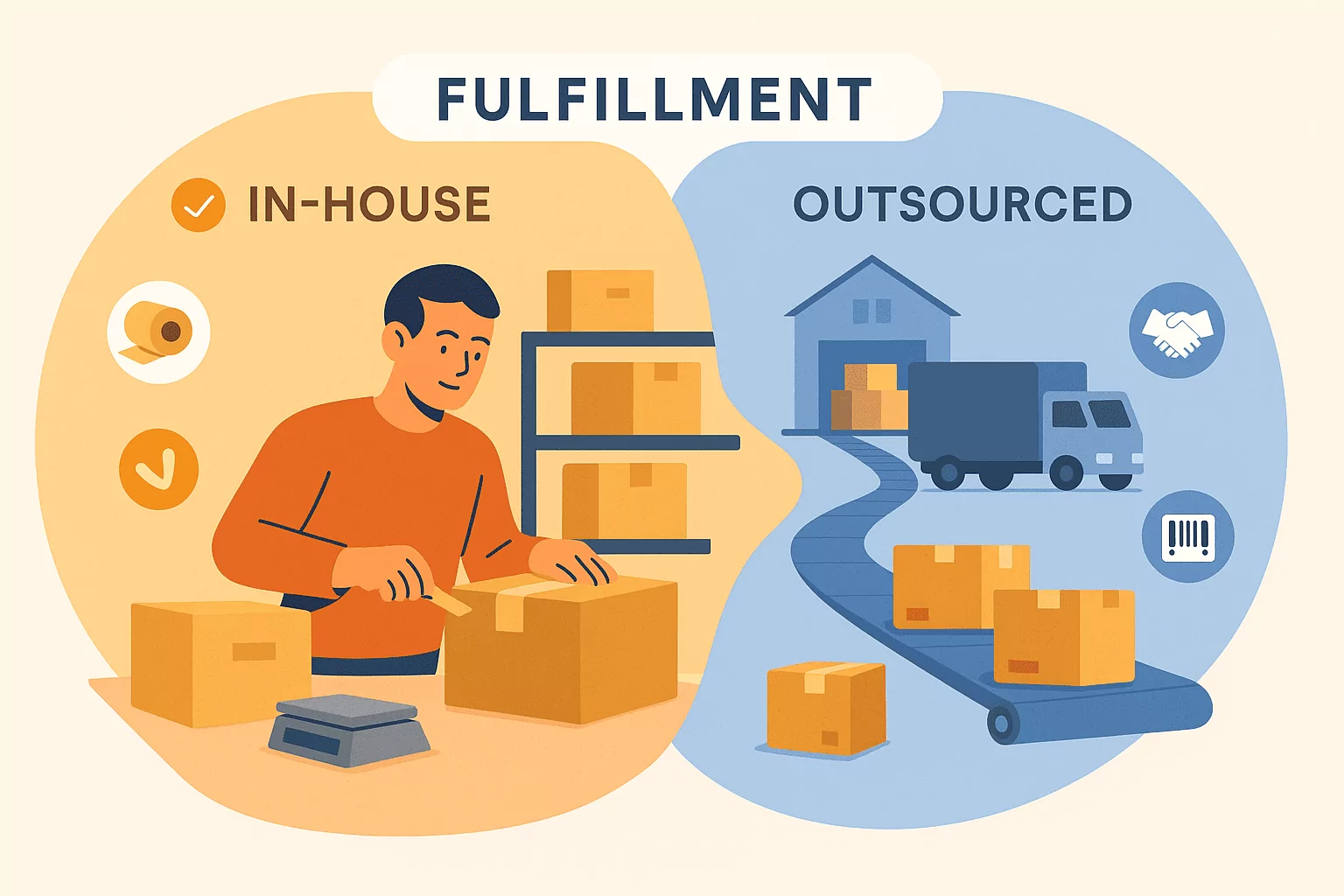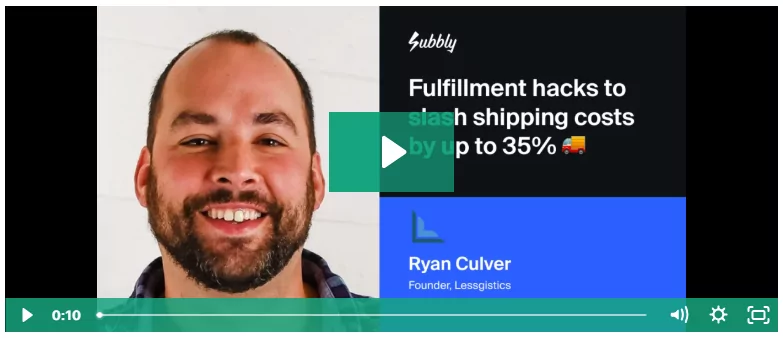What Is Subscription Box Fulfillment?
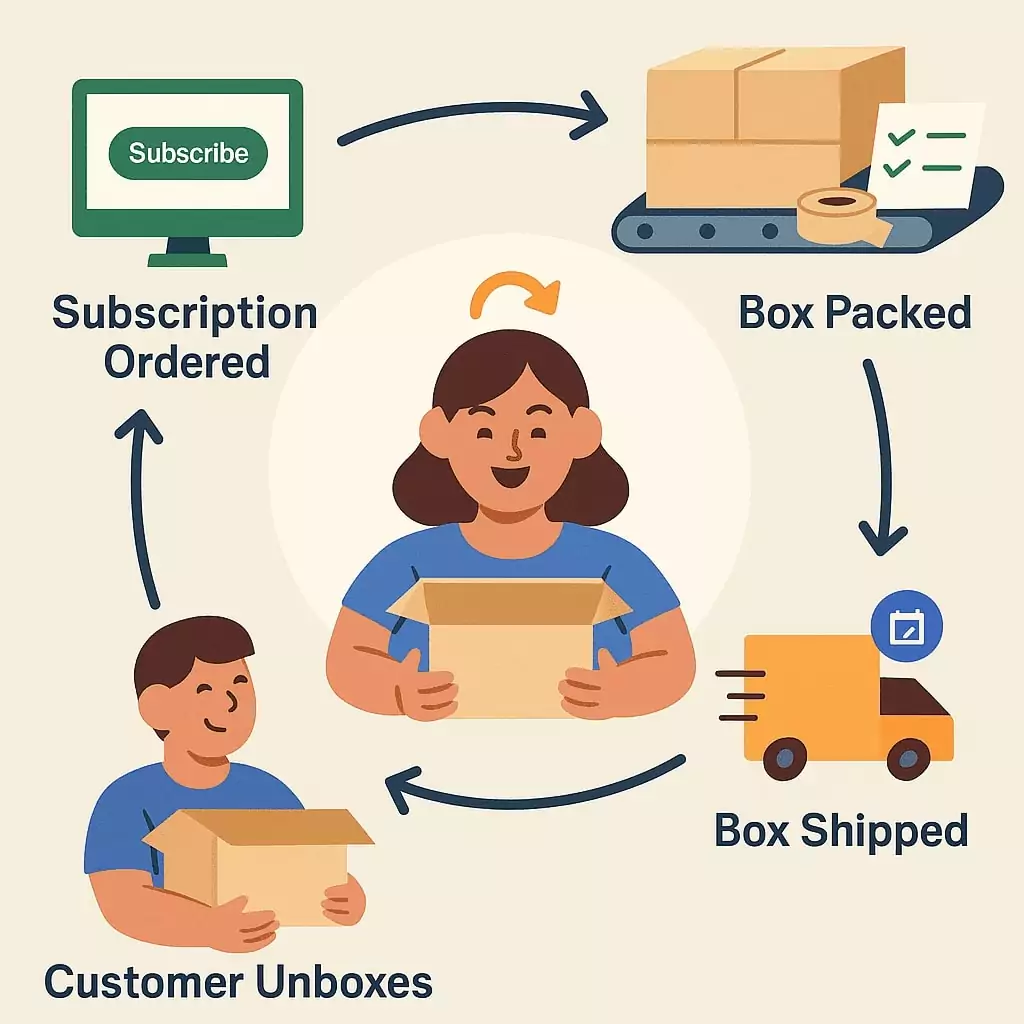
Subscription box fulfillment is the process of storing, managing, packing and shipping products to subscribers regularly.
This is different from one-time ecommerce order fulfillment because it involves repetitive, scheduled shipments.
Subscription box services also tend to focus on products that people need or enjoy, use regularly and need to replenish. This could include razor blades for shaving or fun activities to keep kids entertained.
Types of subscription boxes include:
- Curated boxes (e.g. beauty, lifestyle or books)
- Replenishment boxes (e.g. pet food, grooming products or razors)
- Surprise or seasonal boxes
Products that you would buy as a one-off don’t suit the subscription business model. A good example of this is a high-end DSLR camera.
Why subscription box fulfillment is different
Regular one-off ecommerce purchases usually get shipped one at a time and as soon as possible after the customer places an order.
Subscription boxes, however, are typically shipped every month with orders fulfilled in batches.
This means you need to plan ahead and ensure you have items ready to ship as soon as possible for the coming month.
To achieve this, you need to precisely time your supply chain. Delays in receiving products could lead to delays in packing.
This would, at best, result in more stress for you and your team.
But at worst, it could lead to late deliveries, negatively impacting your brand: 17% of people will stop using a retailer after just one late delivery.
This is especially problematic if you only sell one product, as all your customers will be affected.
This situation is complicated by some intricacies of the subscription business model, including:
- Subscription boxes often include multiple products.
- They usually have more intricate packing requirements, like branded inserts, custom notes or surprise items.
- Customer expectations are higher for subscription boxes, and timely and accurate deliveries are crucial to keeping subscribers happy.
- If an order arrives late, damaged, or incomplete, customers are more likely to cancel, which increases churn.
In other words, getting fulfillment right is critical for subscription brands, as it helps shape the customer experience. These businesses need a process that’s reliable, scalable, and designed specifically for recurring shipments.
The next section explains what that process involves.
For example, most subscription businesses sell directly to consumers (rather than through an intermediary), while many D2C companies offer subscriptions.
Check out our article on D2C fulfillment. It covers some of the same concepts as this guide, but with a focus on the D2C business model.
What Does the Subscription Box Fulfillment Process Involve?
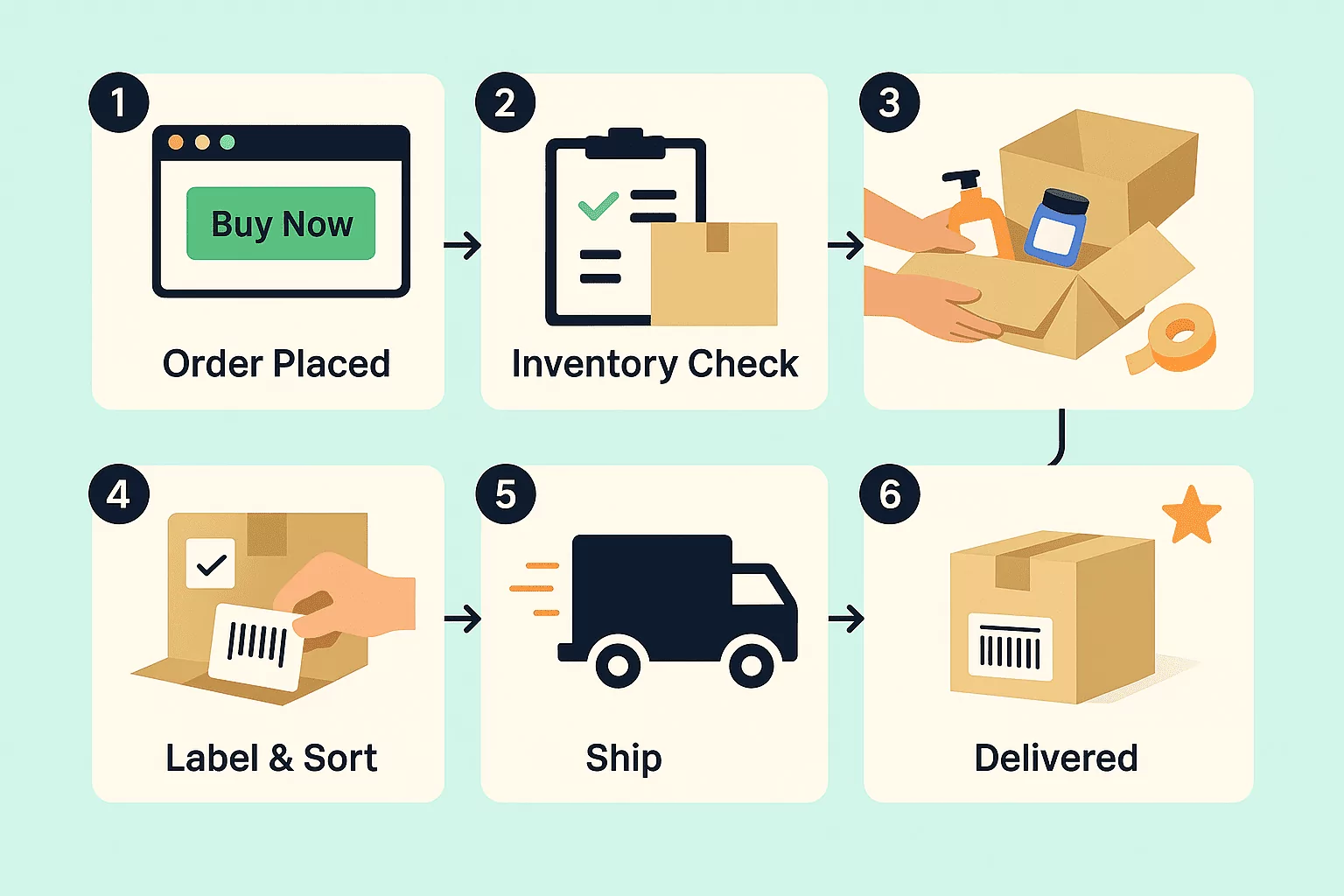
Fulfillment is a multi-stage process and you need to ensure every stage runs smoothly to achieve success.
Unfortunately, you won’t have the luxury of focusing on one aspect at a time. Instead, you’ll be trying to juggle all stages at the same time. This means that each step needs to be carefully coordinated.
The main stages involved in subscription fulfillment are:
- Inventory management
- Receiving orders
- Picking and packing
- Unboxing/messaging
- Shipping
- Return management
Let’s look at each in detail.
1. Inventory management
This essentially involves ensuring that you have enough stock to fulfill future orders.
It’s a careful balance: order too much and you’ll waste money and use up storage space. Buy too little and you’ll be unable to fulfill orders.
Order too early and perishables might go bad. Buy too late and you risk missing shipping dates.
There are a couple of key factors to get inventory management right:
- Forecasting: Predict demand in advance and carefully time your purchases and warehouse deliveries. This helps you maintain optimal stock levels and avoid overselling and holding costs.
- Storage: Ensure you have enough space for your orders; at the same time, avoid wasting money on excess storage. Track expiry dates to avoid unnecessary waste.
Inventory management software helps with these factors. They can help you sync inventory levels in real time to avoid overselling or stockouts.
Subbly is an ecommerce platform designed specially to meet the needs of subscription businesses.
It includes a range of inventory management tools to help you keep track of stock levels.
Check out our guide to Subbly’s inventory tools to learn more.
2. Receiving orders
As mentioned, subscription businesses ship orders in batches. This means that any new orders are simply added to your schedule for sending existing batches.
It’s a good idea to give customers clear cut-off dates to let them know when to order by. For example, you might have a pop-up on your website saying, “Time’s running out! Order by the 15th to get this month’s box.”
Not only does this communicate timings clearly to customers, but it also creates urgency, which can help improve sales.
It’s also useful to tell customers when they can expect to receive their next subscription box. This has to be unique to each customer, as some will be closer to you than others and will therefore have shorter delivery timeframes.
3. Picking and packing
Picking and packing can be a serious undertaking for larger subscription box companies. Let’s say you have 200 customers and each box takes 5 minutes to pick and pack. That means the whole process will take around 16 hours!
Now, imagine what happens if you get more customers or start offering a wider range of products. The time taken to complete the process will increase dramatically. Hiring people can help, but what will they do when not packing?
Planning, coordination and efficiency are therefore crucial at this stage.
Packing is also an important part of the customer experience. The care your team has taken will be evident when the customer opens their box.
81% of consumers prefer shopping with companies that offer a personalized experience. So ensuring things like branded tissue paper, customized packaging, inserts and personalized notes are perfectly placed will have a big impact, but it also adds time and expense.
4. Consider unboxing
We went into some detail about this in the section above, but it’s worth stating again and going deeper.
For subscription businesses, the way a box looks and feels when opened is a key selling point. A well-designed unboxing moment can drive excitement, brand loyalty, and social sharing.
Small touches can turn a routine delivery into a memorable experience. Include things like:
- Thank-you notes
- Product guides
- Discount card
- Personalized messages
These can add value and improve customer relations.
In one study, companies that included a thank-you note and a free sample in their boxes saw a 30% increase in social media mentions and experienced a retention boost.
Remember to use branded packaging, colors, and a clear tone of voice to help reinforce your business identity with every box you send. Consistency will help reinforce your brand identity and build a long-term brand reputation.
5. Shipping
This is the stage where your subscription boxes leave your premises and are delivered to customers.
Mastering the shipping process depends on having reliable shipping carriers, with tools that allow you and your customers to track orders and keep everyone informed of delivery timeframes.
Logistics partners often agree on a regular set day or date to collect your shipments. This means you’ll need to plan the rest of the process around this date.
Shipping can be incredibly complex, especially when delivering overseas. You’ll need to consider factors like:
- How size and weight affect shipping costs
- Import taxes
- Custom duties
- Additional time taken to deliver overseas
- Banned or regulated items
Shipping can be expensive and increase your operational costs. Check out our top 10 ways to save money on shipping.
Learn more about optimizing shipping. Check out Ryan Culver’s video on fulfillment hacks to slash shipping costs by up to 35%.
6. Return management
Returns are fairly rare for subscription boxes. In fact, many subscription companies don’t accept returns unless the items are damaged or if they were sent by accident (for example, if someone cancelled their renewal at the last minute).
Subscription companies need clear return policies outlining what qualifies for a refund or return. They should also make it as easy as possible for customers to request refunds and return the product to you.
This is where using a third-party logistics (3PL) company can help. We’ll explain more about these companies and how they can help you later. For now, it’s useful to know that they can handle returns processing for you.
Subscription Fulfillment Options
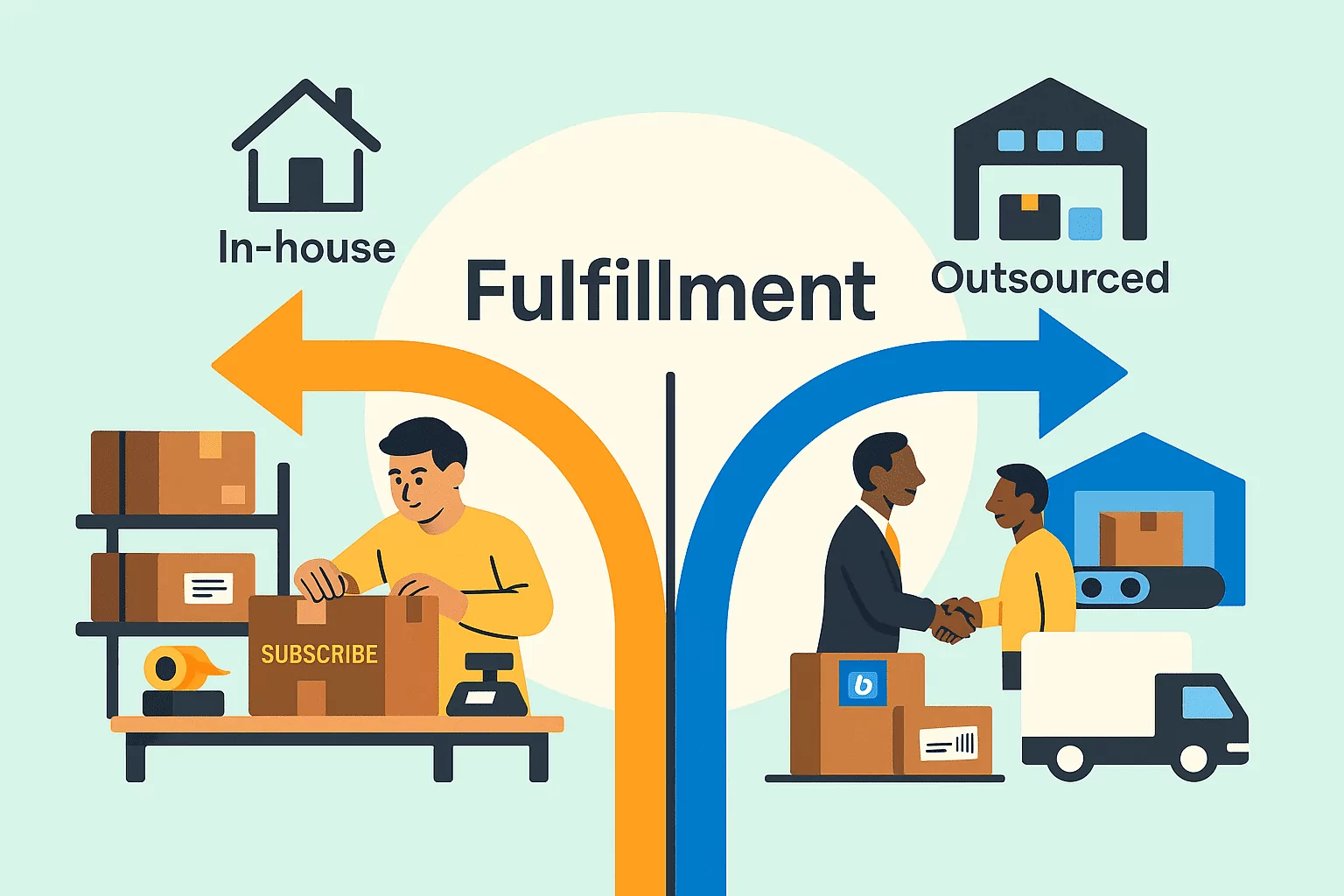
Now you understand the fulfillment process, the next step is to decide how to handle it. You have two main options: fulfill boxes yourself or outsource to a 3PL provider.
Which one you choose depends on factors like:
- Number of orders
- Storage space
- Time
- Team capacity
This section will cover what to consider for each, as well as the pros and cons of them.
In-house fulfillment
This means you handle the fulfillment process yourself. You store products, pack boxes and ship them out (although you obviously won’t be driving them to the customer’s door!).
In-house fulfillment is often used by startups with a small number of orders, with many working out of their own home, a garage or a small warehouse. At this point, it makes sense to save money by packing boxes yourself.
Get the right fulfillment tools
Having the right software can help you get in-house fulfillment right. For example, subscription ecommerce platforms like Subbly can help automate key areas through tools like:
Auto-generated recurring orders: Orders are created automatically based on your subscription billing cycles, so your fulfillment schedule stays in sync.
Inventory management tools: Track stock levels for each product and variation to avoid overselling and forecast future needs.
Product bundling and kitting: Easily create and manage bundles or curated boxes with multiple SKUs per order.
Shipping label integration: Generate shipping labels through built-in integrations with providers like ShipStation and Pirate Ship.
Customer order processing management: View and manage customer orders from a single dashboard, including address changes, skips, and cancellations.
Cut-off date control: Set order and shipping cut-off dates to streamline batch fulfillment and avoid last-minute surprises.
Custom order data exports: Export CSVs of upcoming orders for easier warehouse planning or manual label creation.
Subscription pause and skip logic: Keeps fulfillment accurate by reflecting real-time changes in subscriber preferences.
Order status tracking: Mark orders as fulfilled and trigger shipping confirmation emails automatically.
In-house fulfillment pros and cons
Pros:
✔️ Complete control over the process and presentation: This makes it easier to ensure quality, accuracy and brand consistency.
✔️ Custom branding is easier: Adding inserts, handwritten notes, or themed packaging is much simpler when you’re packing the boxes yourself.
✔️ Lower costs at small volumes: 3PLs often have minimum fees, which may not offer value for money for small volumes.
✔️ Easier to make last-minute changes: If there’s a last-minute product swap, in-house teams can react faster without waiting on a third party.
Cons:
⚠️ Time-consuming as you grow: The more orders you get, the more time is eaten up by packing and admin.
⚠️ Space and storage limitations: Keeping products in your spare room might work early on, but it’s not scalable. You’ll eventually need shelving, inventory systems, and a dedicated area.
⚠️ Harder to scale: As your services scale, you’ll need to hire more staff, rent more space, manage logistics, all while continuing to deliver great customer service. Your business becomes more complex and harder to grow.
Outsource to a 3PL provider
A 3PL provider handles all subscription fulfillment operations on your behalf, including warehousing, packing and shipping.
You simply send your products to the 3PL and send them your customer orders.
There’s a ton of 3PLs out there, so it’s important to find one that specializes in subscription box fulfillment services and not just general ecommerce.
Pros of outsourcing to a 3PL
✔️ Saves time: Outsourcing your fulfillment frees you up to focus on marketing, product development, and customer retention.
✔️ Scalable: You can easily handle growth or seasonal spikes without needing to hire extra staff.
✔️ Professional infrastructure: Economies of scale mean that a 3PL can provide you with more space at its fulfillment centre, faster picking and packing, and often better shipping rates due to carrier partnerships.
✔️ Error reduction: 3PLs often have experienced staff and thorough systems that reduce fulfillment mistakes.
Cons of outsourcing to a 3PL
⚠️ Less quality control: You can’t oversee packing or add last-minute touches as easily.
⚠️ Higher upfront costs: You’ll typically pay for setup, storage, pick-and-pack fees, and shipping.
⚠️ Finding the right partner can be challenging: As mentioned, some 3PLs focus on one-off orders, while others simply may not be a good fit for your business.
What to look for in a 3PL partner
A good subscription-focused 3PL fulfillment partner will have:
Subscription experience: Look for a provider that understands recurring orders, batch shipping, and monthly cycles.
A good track record: Look for partners with a good reputation for providing good service and accurate deliveries. Google reviews or platforms like Trustpilot are a good place to start.
Kitting support: Kitting means assembling multiple products into one box before shipping. Many subscription boxes include 4–8 items per order, so it’s vital that your 3PL can handle this efficiently.
Custom packaging: Can they add branded boxes, inserts, stickers, or handwritten notes?
Platform integrations: Choose a 3PL whose systems integrate directly with your ecommerce platform to take full advantage of its automated tools.
Transparent pricing: Make sure you understand storage fees, pick-and-pack costs, and shipping rates. This avoids any hidden costs.
Responsive support: Fast, helpful communication matters, especially when you’re on a deadline or resolving customer issues.
When to outsource
As mentioned earlier, we recommend that businesses start out handling their fulfillment. If you’re only on your first 10 customers, why waste money paying someone else to do it?
But deciding when to leap and hire a 3PL is tricky. Here are four signs that you should consider outsourcing to a subscription fulfillment service
- You’re spending more time packing than growing your business: You should be spending more time on improving your product, marketing your business and retaining customers than boxing and shipping.
- You’re running out of space: If your living room, spare room, or garage is no longer cutting it, then it might be time to outsource. You could always upgrade to a small warehouse; however, this comes with its own additional challenges.
- You’re beginning to make mistakes: More customers mean more complexity. You also might have less time to pack boxes, meaning you have to rush. This can lead to errors that could impact customer satisfaction.
More scalable shipping: Your shipping provider might be struggling to deal with the weight of your orders or the cost of shipping might be spiralling. As mentioned earlier, most fulfillment companies have strong relationships with shipping partners, allowing them to get your products to customers more efficiently.
Yes, it’s not uncommon for businesses to use in-house and 3PL elements in their business. Common setups include doing your own packing but outsourcing shipping, or only outsourcing part of your product line. A hybrid approach is especially useful for seasonal spikes, international orders or unusual items (like heavy or bulky products).A hybrid approach is also a good way to test 3PL partners before you commit to a full agreement.
How to Improve Subscription Box Fulfillment
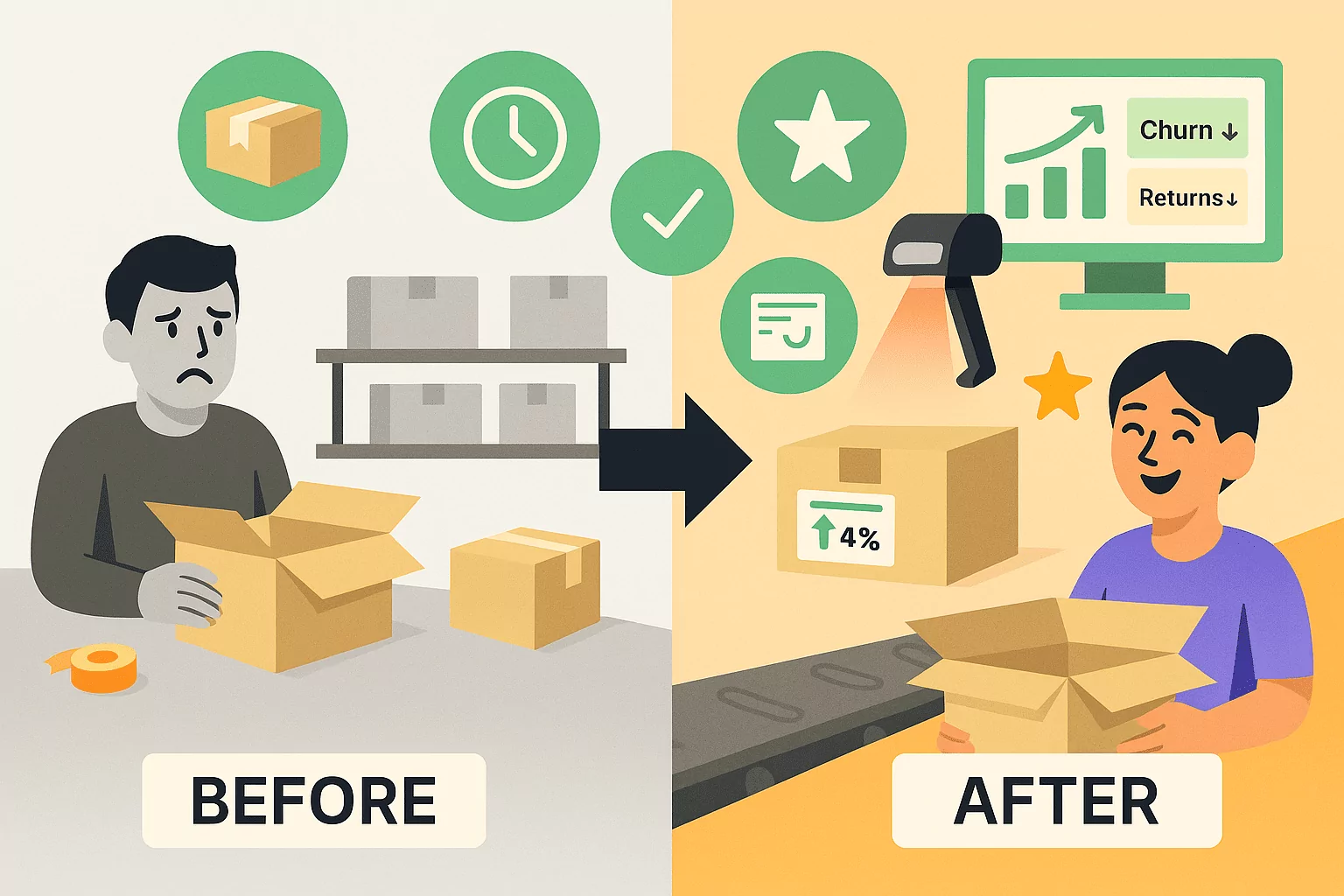
The subscription model is all about making tweaks to each stage of the subscription cycle.
Fulfillment is no different. By making regular small improvements, you can increase speed, accuracy, and customer satisfaction.
Here are a few factors to focus on:
Forecast demand more accurately: Use past sales data and subscriber trends to predict how much stock you’ll need for future cycles. This helps avoid over-ordering or not having enough stock.
Automate wherever possible: Automate recurring order generation, label printing, inventory syncing, and customer notifications. This will mean less admin and fewer mistakes.
Improve your packing process: Organize your packing station, use checklists, and train your team on efficient kitting workflows. Packing errors are one of the most common reasons for cancellations.
Standardize your unboxing experience: Make sure every box looks and feels consistent. That means the same branded packaging, inserts, and tone, week in, week out.
Track your fulfillment KPIs: Monitor metrics like order accuracy rate, average fulfillment time, and on-time shipping percentage. These will tell you what’s working and what needs improvement.
Automate Fulfillment With Subbly
Getting subscription box fulfillment right isn’t just about logistics; it’s about delivering a consistent, high-quality experience that keeps customers coming back.
Whether you’re packing orders from your kitchen table or partnering with a 3PL, the goal is the same: reliable shipping, memorable unboxing, and minimal friction for your business and customers.
If you’re fulfilling in-house, Subbly gives you the tools to stay organized and efficient: from automated order management to shipping integrations and inventory tracking.
Ready to streamline your fulfillment process? Sign up for a free trial and explore Subbly’s features and see how we can support every step of your subscription journey.

